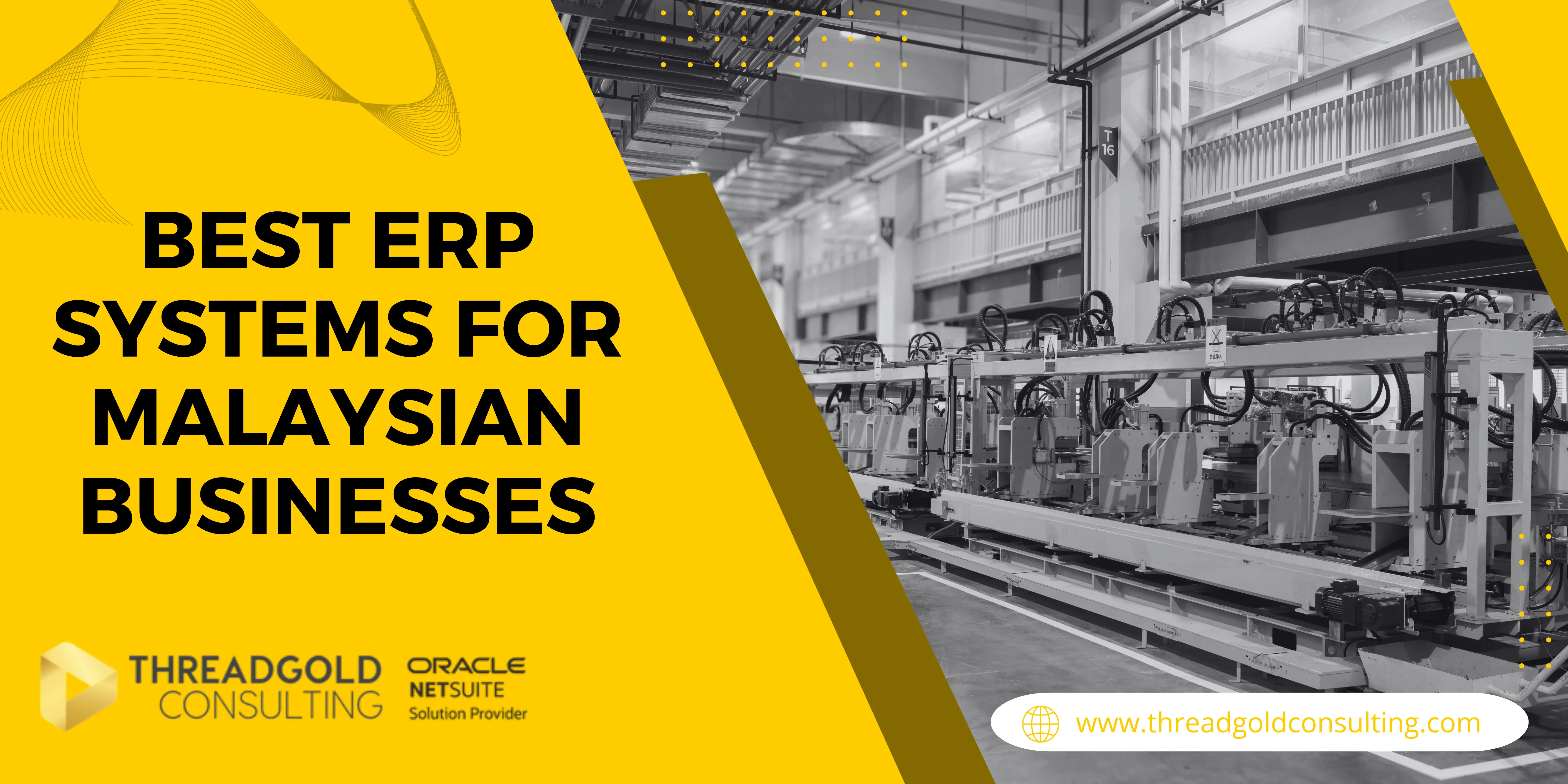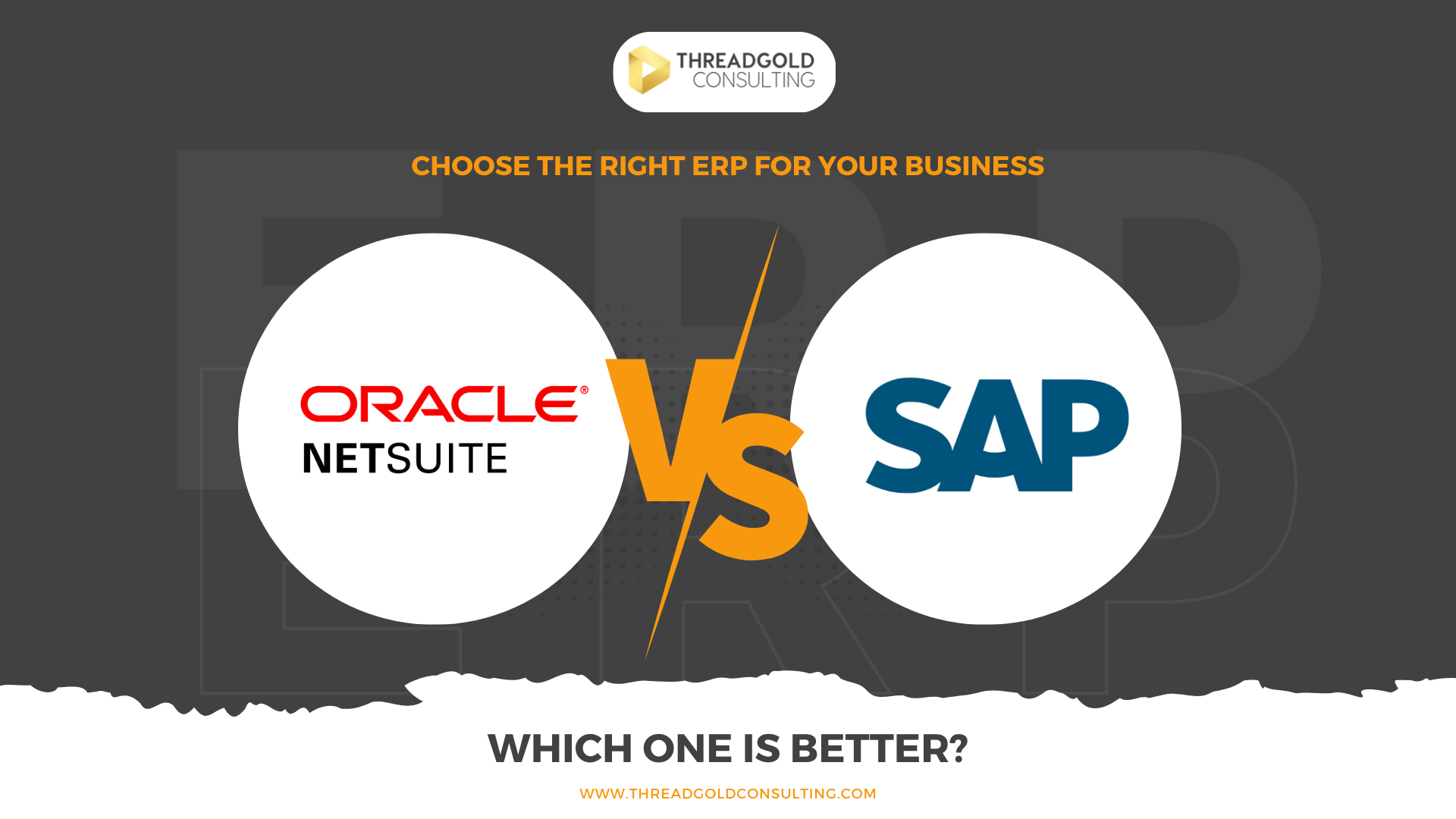For accounting and IT professionals who are at the heart of business transformation, Enterprise Resource Planning (ERP) systems are no longer an option but a necessity. These systems are key drivers in bolstering efficiency, simplifying complex business processes, and ensuring informed decision-making.
Organisations are more spoilt than ever with a huge variety of quality ERPs to choose from, so choosing the right system can become quite confusing. We are here to explain the key features of the best ERP systems available in Malaysia, and help make this decision a bit easier.
Table of Contents:
- Key factors to consider before choosing an ERP system
- Oracle NetSuite
- SAP
- Microsoft Dynamics 365
- Epicor
- Infor
- Acumatica
- Sage X3
Key factors to consider before choosing an ERP system
Before getting into features, pricing, or even vendors, it’s essential to lay the groundwork. Choosing an ERP system is a major decision, one that will impact your business processes, people, and performance for years to come.
Business Requirements and Long-Term Goals
Start by undertaking and business process review and outlining your core business needs. Are you looking to automate financial processes, gain better inventory control, or improve project tracking? Do you operate across multiple entities or currencies? What are your long-term growth plans?
Answering these questions will help you prioritise features and narrow down ERP options. Having clarity on your business objectives also ensures that the ERP system aligns with your strategic vision.
Regulatory and Tax Compliance in Malaysia
Malaysia has its own set of statutory requirements, from SST (Sales and Service Tax) to EPF, SOCSO, and PCB payroll deductions. Your ERP system must be able to handle these seamlessly.
Look for systems with:
- SST-ready invoicing and reporting
- Local payroll compliance (EPF, SOCSO, EIS, PCB)
- MYR multi-currency and statutory financial formats
- Integration with LHDN for tax submissions
Failure to comply can lead to penalties, so this is a non-negotiable for Malaysian businesses.
Budget and Total Cost of Ownership (TCO)
Many companies fall into the trap of focusing solely on upfront software costs. But ERP costs go far beyond that.
You must factor in:
- Implementation and setup
- Ongoing support and maintenance
- Staff training and onboarding
- Customisation and integration work
- Upgrades and scalability
A system that seems affordable upfront might cost more in the long run if hidden costs pile up.
Local Support and Vendor Partnerships
ERP implementation isn’t just about the software, it’s about who’s there to help when issues arise. Working with a vendor or partner that understands the Malaysian business landscape is a huge plus. A lot of ERP vendors leave you high and dry when you're live, or charge extremely high fees for a support contract. It's much better to go opt for a partner, like Threadgold Consulting, who care about your implementation and won't abandon you the minute you go live.
Choose vendors/partners who offer:
- On-the-ground implementation teams
- Local support in English and Bahasa Malaysia
- Knowledge of Malaysian compliance
- Proven success in your industry
We have a proven track record of implementing NetSuite into Malaysian businesses.
Data Migration and System Integration
ERP systems don’t exist in a vacuum. You’ll likely need to migrate data from legacy systems or integrate with existing tools like accounting software (e.g. UBS, SQL), e-commerce platforms, or banking systems.
Plan data migration early, including:
- Data cleansing and formatting
- Mapping old data fields to new ERP structures
- Validating post-migration accuracy
Poor data quality is one of the biggest causes of ERP failure.
Change Management and Staff Training
The most powerful ERP system won’t help if your staff doesn’t use it properly. Resistance to change, lack of training, and unclear processes can all undermine your investment.
Build change management into your plan:
- Communicate benefits early and often
- Appoint internal champions or super-users
- Offer hands-on training sessions
- Allow time for adoption and troubleshooting
Overview of Top ERP Systems in Malaysia
Now let's take a deep dive into some of the top ERP systems available in Malaysia, taking into account their features, usability, customer service, and overall performance.
Oracle NetSuite
Oracle NetSuite is a globally renowned provider of cloud-based financials / Enterprise Resource Planning (ERP), HR, and omnichannel commerce software that helps businesses streamline their operations and drive growth.
NetSuite's ERP solution is comprehensive and designed to scale with businesses as they grow, from start-ups to large enterprises. It serves a broad spectrum of industries, including manufacturing, wholesale distribution, retail, services, nonprofit, and more.
This platform offers a unified business management suite, encompassing ERP/Financials, CRM, and eCommerce. It's well-liked for its flexible, module-based approach, where businesses can add or remove functionalities as needed, keeping their operations lean and efficient.
Ideal for businesses that need a powerful yet flexible business management system, Oracle NetSuite is particularly useful for companies looking for a robust financial management system, or those operating in multiple countries requiring multi-currency support.
Pros:
- Comprehensive solution catering to businesses of all sizes, from SME to large enterprise.
- Flexible subscription pricing, allowing businesses to scale up or down based on their needs.
- Robust customisation options enabling businesses to adapt the software to their specific requirements.
- Strong financial management features, providing powerful accounting and financial planning capabilities.
- Efficient financial consolidation and multi-currency transactions support, ideal for businesses operating in multiple countries.
- Real-time insights with customisable dashboards, offering data-driven decision-making tools.
Cons:
- Subscription pricing may fluctuate and can be on the higher side for smaller businesses.
- Basic support may be limited, with more comprehensive support available at an additional cost.
- Report customisation, while powerful, can be challenging for non-technical users.
Who It’s Best For: Businesses with complex financial operations, regional expansion plans, or those needing strong analytics.
Pricing: RM8,000–RM20,000/month depending on modules and number of users. Add-ons and support may be extra. Our pricing guide explains this in further detail, or you can get a personalised quote using our NetSuite pricing calculator below.
SAP
SAP's ERP solutions, known as SAP S/4HANA, SAP BusinessOne and Business ByDesign, are designed to manage business operations across finance, HR, sales, procurement, manufacturing, and service. SAP's solutions are known for their configurability, scalability, and robustness. They are often favoured by large enterprises across various industries, from manufacturing and logistics to healthcare and finance.
SAP ERP solutions are designed to handle complex business processes, making them ideal for large enterprises with diverse operations. The comprehensive suite of applications allows businesses to manage nearly every aspect of their operations from a single platform.
SAP's solutions are built to integrate with various technologies, including advanced analytics, IoT, machine learning, and blockchain, making them a future-proof choice. They also offer cloud, on-premise, and hybrid deployment options, catering to the unique needs of different businesses.
Pros:
- Highly scalable and robust, perfect for large enterprises with complex operations.
- Offers an extensive suite of applications, ensuring a comprehensive coverage of business processes.
- Strong track record and presence in the industry, offering reliability and trustworthiness.
Cons:
- SAP's solutions can be complex, often requiring professional expertise and a longer time frame to set up and manage effectively.
- High implementation cost and time, potentially making it less feasible for small to medium-sized businesses.
- Customisation, while possible, can be challenging and costly, requiring specialist knowledge or consultants.
Who It’s Best For: Enterprises and SMEs with industry-specific needs and complex operations.
Pricing: RM15,000–RM50,000+ for setup and implementation. Annual maintenance and support add to TCO.
Check out our detailed breakdown of how SAP fairs in comparison to NetSuite for factors such as pricing, implementation, ease of use and more.
Microsoft Dynamics 365
Microsoft Dynamics 365 is part of the broader Microsoft ecosystem. Born from the fusion of Microsoft's earlier ERP and CRM products (Dynamics AX and CRM), Dynamics 365 was launched in 2016 as a cloud-first, mobile-first, flexible platform that would better serve the changing needs of modern businesses.
It is a set of intelligent cloud-based business applications that combines CRM and ERP capabilities to manage core business functions across sales, customer service, operations, financials, marketing, and project service automation.
Microsoft Dynamics 365 provides a seamless user experience that connects data, people, and processes. It easily integrates with other Microsoft products, such as Office 365, making it an appealing choice for businesses already using Microsoft tools.
Dynamics 365 also leverages artificial intelligence to provide predictive insights, promote efficiency, and assist with decision-making. It's a good fit for small to large businesses in Malaysia and is scalable to fit the needs of any growing organisation.
Pros:
- Seamless integration with Microsoft products, providing a unified experience and reducing the need for switching between applications.
- AI-driven insights offering data-driven decision-making and predictive analytics.
- Good scalability, enabling businesses to adjust their usage as they grow.
Cons:
- May have higher total costs due to add-ons. While the modular approach allows businesses to pay for what they need, it can add up.
- Requires professional expertise for implementation, which could increase the overall cost.
- Some users report a steep learning curve, especially for those not familiar with Microsoft's ecosystem.
Who It’s Best For: SMEs and larger companies who rely on Microsoft tools and want flexible, modular ERP.
Pricing: RM5,000–RM20,000+/month depending on user count and modules.
Check out our guide for a further analysis of Microsoft Dynamics 365.
Epicor
Epicor ERP is a comprehensive software suite designed to support various business processes and operations typically found in manufacturing, distribution, retail, and service industry companies, making it a great fit for the Malaysian market. It's affordable pricing makes it ideal for small to medium sizes businesses, and it offers a flexible and scalable solution that can grow with the organisation.
It offers a wide range of features including robust manufacturing support, efficient supply chain management, comprehensive financial management, CRM, detailed project management, and business intelligence and analytics.
Additionally, Epicor provides flexibility and accessibility through mobile and cloud capabilities, allowing businesses to customise their setup, streamline operations, and make informed decisions wherever they are. Its industry-specific tools and scalable platform support businesses in managing their complex processes and growing efficiently.
However, one of the main drawbacks is that it does not provide automatic updates like most ERPs. Updates need to performed by experienced implementation partners, and this can make the total cost of ownership much higher than originally anticipated.
Pros:
- Robust industry-specific solutions.
- Good customer service.
- Offers both on-premise and cloud-based solutions.
- Affordable pricing.
Cons:
- Interface can be clunky and not as user-friendly.
- Upgrades can be complex.
- Can be costly for small businesses.
Who It’s Best For: Manufacturing or distribution firms looking for tailored functionality.
Pricing: Starts at RM4,000/month. Total cost depends on deployment model and modules.
Infor
Infor is an enterprise software provider and strategic technology partner for over 90,000 organisations worldwide. Founded in 2002, Infor is known for delivering industry-specific ERP solutions, which are designed with the unique needs of specific industries in mind. Their aim is to empower companies to achieve a competitive edge and drive growth.
Infor's ERP solutions include CloudSuite Industrial, CloudSuite Distribution, CloudSuite Fashion, CloudSuite Equipment, and others, each tailored for specific industries. They have a strong presence in sectors such as manufacturing, healthcare, retail, distribution, and hospitality.
Infor’s ERP solutions are comprehensive and designed to meet the needs of businesses of various sizes. These solutions focus on providing industry-specific functionalities, meaning they come with features tailored to the unique needs and challenges of different industries.
The platform’s user-friendly interface enhances usability and minimises the need for extensive training. However, while the core ERP functionality is robust, some businesses might need to purchase additional modules to meet their unique needs.
Pros:
- Strong industry-specific functionalities, enabling businesses to handle unique processes and regulations in their industry.
- User-friendly interface, enhancing usability and reducing the need for extensive training.
- Comprehensive suite of applications, enabling businesses to manage multiple aspects of their operations from a single platform.
Cons:
- Upgrades can be challenging and may require professional assistance, which could increase the total cost of ownership.
- While Infor is continuously working to improve its customer service, some users report that it could be better.
- Depending on the specific needs of a business, it may require additional modules at an extra cost.
Who It’s Best For: Companies needing highly tailored ERP solutions with industry templates.
Pricing: Custom pricing depending on modules and deployment model.
Acumatica
Acumatica is a technology firm that specialises in cloud and browser-based business management software. Established in 2008, it aims to deliver adaptable cloud and mobile technology with a unique all-inclusive user licensing model, offering tailored solutions for a broad range of business applications.
Acumatica's cloud-based ERP solutions are designed for small and medium-sized businesses (SMBs), offering strong capabilities across core financials, distribution, manufacturing, project accounting, and CRM. With its scalability, businesses can easily grow with the system, adding users without significant additional costs.
Acumatica is known for its intuitive and user-friendly interface, which can increase productivity and ease the learning curve for new users. The system also offers strong CRM integration, ensuring seamless communication and data flow between departments.
However, Acumatica, while solid for SMBs, might not offer the breadth and depth of advanced features that larger, more complex Malaysian businesses may require.
Pros:
- Good scalability, making it an excellent choice for growing SMBs.
- User-friendly interface, promoting productivity and user adoption.
- Strong CRM integration, enabling a smooth flow of information between sales, marketing, and customer service.
Cons:
- Lacks some advanced features, which could limit its application for large, complex businesses.
- Limited customisation options, which may be restrictive for businesses with specific requirements.
- Some users have reported slow system response times, which could affect productivity.
Who It’s Best For: SMEs looking for flexible pricing and cloud-native performance.
Pricing: RM3,000+/month, depending on features and implementation partner.
Sage X3
Sage X3, now known as Sage Business Cloud X3, is a product of Sage Group, a British multinational enterprise software company founded in 1981. Sage offers a wide range of software solutions, with Sage X3 being its flagship ERP product designed for mid-sized to large organisations.
Sage X3 is a flexible, user-friendly ERP solution that provides a variety of features and tools to manage core business processes, including finance, supply chain, and manufacturing operations. With its robust functionality, Sage X3 can be customised to fit the specific needs of a variety of industries.
Sage X3's user-friendly interface enhances usability and minimises the need for extensive training. It offers a comprehensive suite of applications, enabling businesses to manage multiple aspects of their operations from a single platform.
However, Sage X3 may not be the most cost-effective solution for small businesses. While it offers a breadth of functionalities, its cost can be a barrier for smaller organisations. Additionally, while the platform offers customisation capabilities, customising reports can be complex and may require professional assistance.
Pros:
- Robust functionality with good customisation options, catering to a wide range of industry-specific needs.
- User-friendly interface, enhancing usability and reducing the need for extensive training.
- Comprehensive suite of applications, enabling businesses to manage multiple aspects of their operations from a single platform.
Cons:
- Can be expensive for small businesses, making it more suitable for mid-sized to large organisations.
- While Sage is continuously working to improve its customer service, some users suggest it could be better.
- Report customisation, while powerful, can be complex and may require the help of IT professionals or consultants.
Who It’s Best For: Growing companies with complex supply chains or international operations.
Pricing: RM10,000+ for setup; license and support fees vary.
Comparison Table
| ERP System | Best For | Key Features | Malaysian Compliance | Estimated Cost (MYR) | Local Support |
|---|---|---|---|---|---|
| NetSuite | Mid-large businesses | Real-time analytics, multi-entity, cloud-native | Yes | RM8,000–RM20,000/month | Yes |
| SAP | Large enterprises | Deep integration, industry-specific modules | Yes | RM15,000–RM50,000+ | Yes |
| Dynamics 365 | SMEs to enterprises | Microsoft integration, modular, AI features | Partial | RM5,000–RM20,000+/month | Yes |
| Epicor | Manufacturing SMEs | Industry templates, role-based dashboards | Yes | RM4,000+/month | Yes |
| Infor | Industry-specific | Tailored suites, embedded analytics | Yes | Custom pricing | Yes |
| Acumatica | SMEs | Open API, mobile-first, modern UI | Partial | RM3,000+/month | Yes |
| Sage X3 | Mid-large businesses | Complex inventory, finance, configurable modules | Yes | RM10,000+ setup | Yes |
| HashMicro | Malaysian SMEs | Quick setup, SST-ready, modular | Yes | RM1,000–RM3,000+/month | Yes |
| AutoCount | Local SMEs | Accounting, POS, Bahasa interface | Yes | RM3,000+ one-time | Yes |
Best Practises for a Successful ERP Implementation
1. Map Out the Scope Completely
Clearly define what’s included in the project: modules, users, integrations, customisations, and reports. Scope creep can quickly derail timelines and budgets. It's also key to avoid over customising your solution. Over customisation can make the system slow, hard to manage and can often break during updates, meaning more intervention and costs from partners in the future.
2. Assign Roles and Responsibilities
Everyone involved should know their role, from department heads to finance staff, and they should take responsibility for ensuring their tasks are accomplished on time and to a high standard. Establish an internal project team and designate an ERP champion to lead communication.
3. Build a Change Management Strategy
ERP implementations are a massive change, and employees need time to adjust. Set expectations early, offer hands-on training, and use workshops to promote adoption. It's important to ensure your employees feel involved in the process and that their voices are heard. Speaking to each department and understanding their view on things that could be improved is essential. Cultural readiness is as important as system readiness.
4. Allocate Time for UAT (User Acceptance Testing)
Testing is where problems are caught before they become critical. Create test scenarios based on real business cases, and let users validate workflows, reports, and transactions. This will allow you to see where issues will arise on go-live, and catch them before they have a business impact.
ERP Implementation Timeline and Ongoing Support
Implementing an ERP system is a major project, typically requiring anywhere from a few months to over a year depending on your business’s size, complexity, and scope.
Smaller companies with simpler requirements and minimal customisation might implement in 3–6 months. Larger enterprises with multiple entities, extensive data migration, or complex workflows may take 9–18 months.
Key factors that affect implementation duration include:
- Number of users
- Data quality and volume for migration
- Customisation levels
- Integration needs
- Time allocated for training and UAT (User Acceptance Testing)
That said, implementation is only half the journey.
After go-live, your ERP will require ongoing support to keep running optimally. This can include technical fixes, updates, compliance changes (e.g., SST rate updates), and future enhancements as your business evolves.
Vendors typically offer multiple support tiers:
- Basic support: Covers patches, bug fixes, and general queries
- Premium support: Includes SLA-based response times, dedicated account managers, or on-site assistance
- Managed support: Full-service support including system monitoring, training, and process re-engineering
Select a support level that aligns with your internal IT capability. If you lack ERP expertise in-house, a managed service model may be the most cost-effective way to ensure system longevity and success.
Best ERP implementation partners in Malaysia
Choosing the right partner is essential to ensuring a successful ERP implementation. Here are a list of the best ERP implementation partners in Malaysia:
- Oracle NetSuite - Threadgold Consulting
- SAP - Axxis Consulting, NTT Data Solutions
- Microsoft Dynamics 365 - EntServ Malaysia
- Epicor - Finsoft Consulting
- Infor - Apex Systems, Fortude
- Acumatica - Netsence
- Sage - CSS Information Consulting
Choosing the right ERP system in Malaysia is a strategic move that can significantly enhance operational efficiency, ensure compliance with local regulations, and support long-term business growth. With options ranging from global platforms like Oracle NetSuite and SAP to more specialised ERP's such as Acumatica, businesses of all sizes can find a solution that fits their needs and budget. The key is selecting a system that aligns with your goals and offers strong local support. Threadgold Consulting helps businesses across Malaysia and Singapore implement and optimise ERP systems, with a focus on NetSuite. Ready to explore what ERP can do for your business? Try NetSuite free for 14 days, no credit card, no obligation.
FAQs
Q: Can I implement ERP in stages, or do I need to go all in?
A: Yes, many ERP systems (like NetSuite and Dynamics 365) offer a modular approach. You can start with finance, then add inventory, CRM, or HR later. This phased approach is often more manageable and less disruptive.
Q: What are the biggest ERP implementation mistakes to avoid?
A: Common mistakes include: skipping business process reviews, underestimating data migration, over-customising, inadequate training, and failing to appoint internal champions. Rushing go-live without proper UAT is another major pitfall.
Q: How do ERP systems support remote or hybrid work models?
A: Modern cloud ERP systems like NetSuite, Acumatica, and Dynamics 365 are accessible from anywhere with an internet connection. They support real-time collaboration, secure document sharing, and mobile dashboards, making them ideal for hybrid teams.
Q: Will ERP replace or integrate with my existing software (e.g. payroll, CRM, POS)?
A: ERP systems can either replace or integrate with current tools. If your existing solutions work well, integration may be the smarter path. However, many ERPs include built-in modules that may eliminate the need for standalone software.
Q: How do I measure ERP ROI after implementation?
A: Look at reductions in manual processes, inventory carrying costs, order errors, reporting time, and IT maintenance. Also measure improvements in financial visibility, customer satisfaction, and forecasting accuracy.
Q: What happens if my ERP provider updates or changes pricing post-implementation?
A: SaaS ERP vendors may adjust pricing or product tiers over time. To avoid surprises, review your contract’s renewal terms, ask about price locks, and ensure you understand what support and modules are included in your subscription.
Q: How secure is cloud-based ERP in the Malaysian context?
A: Top cloud ERP providers offer enterprise-grade security, data encryption, and role-based access control. Many also comply with international standards like ISO 27001 and allow hosting in regional data centres. Always ask about data residency and backups.







